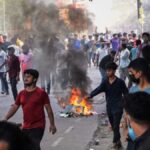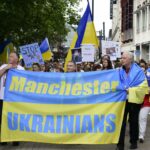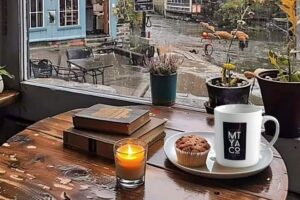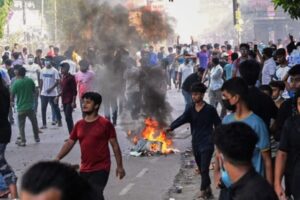One evening in late June, as the day’s heat settled to a temperate 102F (38C), a small crowd gathered on a desolate plot of land in the far reaches of the California desert.
An unrecognizable flag whipped high above a concrete square, where a weather-beaten wooden desk and phone booth had been strategically placed. A glassy security guard booth set in the dirt instructed visitors to “register with border police”, but inside stood only a stoic mannequin wearing a police uniform. Clouds of sand hung like fog on the horizon.
One man held court over this apocalyptic scene, beaming under a stiff military-looking hat threaded in red and gold.
“Thank you, sultan,” said a visitor from the crowd, gripping his hand and smiling for a photo.
Here, more than an hour south of Palm Springs and miles from the nearest town, Randy Williams, a 46-year-old radio DJ from San Diego, is not Randy Williams – not really. He is the self-appointed “sultan” of Slowjamastan: a “micronation” occupying 11 acres of glorified desert scrubland.

But Slowjamastan (an nod to the “slow jams” music genre) is not legally considered a sovereign nation, and it’s not recognized by any government entity. Williams merely bought the land in 2021 for $19,000, promptly declared independence from the United States, and established his micronation as a light-hearted, tight-knit community that pokes fun at the typical trappings of statehood.
Today, it boasts thousands of “citizens” (none of whom actually live in Slowjamastan), hailing from more than 100 different countries. The group has its own federal holidays, laws, parliament and national animal (the humble raccoon). There’s even a faux Slowjamastan border, demarcated by official signs and haphazard sections of barbed wire, small enough to step easily around.
Not everyone gets the concept – including Williams’s mom, who considered his plan to buy the land “very foolish”. But many have gravitated towards the jokey premise for very real reasons: simple connection, a source of daily humor or as a refuge from instability in their home countries.
“For the people who understand Slowjamastan,” Williams said, “it is absolutely a reprieve and an escape from everyday life, which today unfortunately includes so much fighting, so much political divisiveness.”
And Slowjamastan isn’t alone. There are roughly 100 active micronations around the globe, which differ in size and form but typically involve legally unrecognized states that nevertheless “mimic acts of sovereignty”. Many of their leaders, Williams included, attempt to prove their legitimacy by referencing an international agreement signed in Montevideo nearly a century ago that states the qualifications for statehood as merely having a permanent population, a defined territory, a government and the capacity to enter into agreements with other states.
Unlike other secessionist movements in California or the wider US, Williams doesn’t have any true separatist goals, nor any kind of political agenda. Instead, he says, the fascinating “rabbit hole” of pretend nation-building sucked him in several years ago.

In his mini desert kingdom, he mingles with the public like a politician would: greeting citizens, posing for photos behind his desk and giving extemporaneous speeches. “We leave all our labels at the door,” says Williams of Slowjamastan. “I don’t care what you look like, what God you pray to, or what political party you are aligned with. I believe America, and possibly the world, can take a lesson from this.”
Joining is simple; the only requirements are submitting your name, country of residence and other basic details on the nation’s website. One citizen of Slowjamastan is Miriro Matema, a travel writer and marketing specialist from Zimbabwe. Matema first met Williams serendipitously a few years ago, in the comments section of a Facebook group about traveling west Africa.
That online acquaintanceship eventually led to Matema becoming the first African citizen of Slowjamastan, a title she admitted her friends “had a good laugh about”. But the idea of a micronation was an intriguing one, and the sheer diversity of the group’s members was compelling.
“The other micronations I’ve seen are very localized to people in that community,” she explained over a recent WhatsApp call from her home in Johannesburg, mentioning small political groups like the tiny whites-only town of Orania in South Africa.
“But [Slowjamastan] is what a global village is, where you’ve got people from all walks of life being involved in something. We all like to celebrate the good things.”
‘What is, and what is not, a country?’
From the start, Williams was a rolling stone.
Born in Chicago, he grew up in Los Angeles, spent two years in Florida as a teenager, bounced around Arizona, and has now lived in San Diego for the past dozen years. In between those moves, he visited every country in the world, a feat that reportedly only a few hundred others have accomplished.
So when international travel was restricted during the pandemic, Williams chose to dive deeper into the country he lived in rather than explore outwards. A well-timed trip to another micronation in Nevada, the Republic of Molossia, turned out to be all the spark he needed to create Slowjamastan.
In August of 2021, Williams unveiled the Slowjamastan state flag (a raccoon holding a battle ax) and a national anthem (a patriotic tune that sounds remarkably similar to Elton John’s Rocket Man). Once he bought the physical property, he mailed a “declaration of independence” on formal letterhead to Joe Biden and the United Nations, politely informing them that Slowjamastan had “seceded from the United States of America”.
“Also, please don’t send in the troops. We are a peace-loving nation and wish to cooperate with the United States in almost every way,” he said, except for “the taxes and laws”. To date, he has not received a response.

Williams’s seemingly bizarre idea is in good company.
Elsewhere in the world, there’s the Principality of Sealand, an infamous micronation off the coast of the United Kingdom, which teeters on top of a giant platform in the sea. Australia, meanwhile, is thought to be home to one-third of all micronations, including the Principality of Hutt River, whose self-proclaimed prince declared war on Australia by telegram in the 1970s, before announcing two days later the state of war had formally ceased.
Micronations, often led by “committed and eccentric individuals”, are essentially as real as their members believe they are, and can range from the size of a small town, to the corner of a backyard, to nothing but a computer screen.
While these nations typically spin in their own orbits, for a brief moment many of them convened in the same place earlier this month for MicroCon, a “biennial summit” for micro-nationalists. The conference in Chicago featured a formal gala with a suggested “full regalia” dress code, a diplomatic reception and micronation “show-and-tells”.
Arranged like a science fair for adults, the event showcased a long line of homemade poster board presentations about each burgeoning state. Nationalistic trinkets of all kinds were also on display: faux passports, coins, medals, crowns and tiaras. Williams hosted his own booth with a display of Slowjamastan currency and stamps.
To outsiders, the micronation game may feel absurd. But Williams is quick to reference the many countries and territories around the world that may not be fully recognized by the United Nations, or their neighbors, yet maintain their own independence.
“When people are so quick to demand that Slowjamastan is not a real country, then I would challenge them to an intellectual conversation about what is, and what is not, a country?” Williams said, bringing up Kosovo, Vatican City and Taiwan.
“The world is often split on whether those are nations at all. But the people that live there will say absolutely they are.”

Finding the line between the joke and reality
Back in the desert – at least 11 acres of it – the Slowjamastan rule of law reigns supreme, no matter how outlandish.
The footwear Crocs are banned, the official time zone is SST (or Slowjamastan Standard Time) and “slow jams” are, of course, the music of choice.
Slowjamastan citizens gather in the desert several times a year for tongue-in-cheek events including “diplomatic visits”, passport stampings and “sultan selfie” opportunities. While citizenship is free, some devoted members have paid to become “ambassadors” and “parliamentary members” in the desert realm, or even to name their own “state” within Slowjamastan.
The micronation also touts its own small fleet of official vehicles. A shiny fire engine sports a Slowjamastan raccoon, a black SUV is decked out with police cruiser lights and “diplomat” vanity plates, and a white pickup truck announces itself as “PORDER BATROL” with bold lettering on the side.

Mark Corona, dubbed Slowjamastan’s chief border agent, said the latter vehicle has sometimes attracted the wrong kind of attention from actual border officials, who regularly monitor the rugged area about 50 miles from the US-Mexico border. Once, he said, a helicopter with border patrol followed them down the highway.
“When they find out who we are, they’re happy to meet us,” he said.
Donald Caliva, an army veteran and business owner from Los Angeles county, was also wary the first time he happened to drive by Slowjamastan. Metal signs dug into the drifting sand warn: “Beyond this point you are no longer in United States territory. Slowjamastan passport and customs law apply.”
“I’m a veteran, so I kind of took offense,” Caliva said, wearing a black leather vest covered in patches representing both his veteran status and the Slowjamastan raccoon. “Like, how preposterous, who could do this here?”
But when read about Slowjamastan’s eclectic, funny origin story, Caliva “kind of fell in love” with the concept. Caliva fell in love in the traditional sense, too, and proposed to his now-fiance Samantha Speckmeyer, another citizen, in Slowjamastan last year, in front of their own “state” within the micronation.

“You just get to leave everything else behind,” Caliva said, standing in the shade of the Slowjamastan fire truck last month, as other visitors trickled over to drink little plastic cups of Kool-Aid being doled out. “You don’t have to worry about it when you come here.”
Most other citizens, including Matema, the travel writer from Zimbabwe, have never actually been to Slowjamastan. She’s hoping to swing by this fall, while visiting the west coast for a separate travel conference. It would be her first experience in California – and North America entirely.
“Is it really in the middle of nowhere?” she asked with a laugh. “Because that’s the vibe I’m getting.”
But the pseudo-social experiment of Slowjamastan also has real-world consequences. Williams said he has received hundreds of direct messages from people in other countries – Bangladesh being one of the most common – who are genuinely seeking asylum in Slowjamastan and want to move there with their families.
“I take that seriously. I don’t joke about someone trying to find a better opportunity,” Williams said. “So I have to be serious and tell them, ‘Look, this is more of a virtual experience than a physical one.’”

So many have reached out for help that Williams posted an empathetic travel advisory on Slowjamastan’s website, reminding hopeful citizens that the micronation is “completely surrounded” by the US and that the Slowjamastan passport has “not yet been accepted for travel”. Instead, those outside the country can visit Slowjamastan online, he said, and those with the proper US visa can always drive by and check out the area for themselves.
As for Slowjamastan’s future, it promises to be as open-ended, and wildly quirky, as its beginning.
Williams jokingly brings up plans to build a lazy river that weaves through the sand, or maybe an all-you-can-eat Mongolian barbecue restaurant in the middle of nowhere. More realistically, he envisions hauling in a few shipping containers to serve as makeshift offices, and pouring more concrete for a helipad.
If there can be a takeaway from a remote micronation named after a musical genre, Williams hopes it’s that others are motivated to start a creative project of their own.
“Maybe this inspires onlookers, who had no idea that there is a micronational community out there, to dig a little deeper,” he said.















